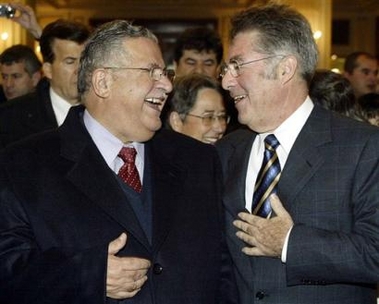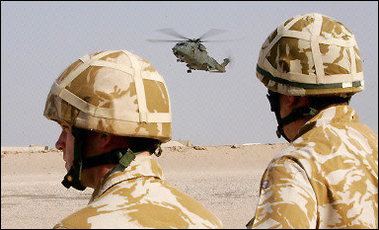|
Iraq leader: UK troops could leave by '06
(AP)
Updated: 2005-11-14 10:29
Iraqi President Jalal Talabani said Sunday that British troops could leave
Iraq by the end of 2006, an estimate that Britain's top soldier said was
realistic but did not amount to a timetable for withdrawal.
Talabani said Iraqi troops should be ready to take over from British forces
in the southern provinces around Basra by the end of next year, adding that no
Iraqis wanted foreign troops to remain indefinitely in their country.
But he warned that an immediate withdrawal of U.S.-led forces would be
catastrophic for Iraq and lead to civil war, with consequences for the entire
Middle East.

Austrian President Heinz Fischer, right, and
his counterpart from Iraq Jalal Talabani share a laugh, on Sunday, Nov.
13, 2005, at a hotel in Vienna.[AP] | "We don't
want British forces forever in Iraq. Within one year — I think at the end of
2006 — Iraqi troops will be ready to replace British forces in the south,"
Talabani said in the interview with Jonathan Dimbleby for Independent
Television.
Prime Minister Tony Blair's administration repeatedly has refused to give a
timetable for withdrawing British troops from Iraq, although a government
memorandum leaked in July said Britain was considering cutting its force from
the current 8,500 to 3,000 by mid-June. Blair and other ministers have stressed
that British troops will stay as long as they are requested by the Iraqi
government.
US President Bush also has refused to set a timetable for withdrawing 150,000
American troops from the country, saying it would play into the hands of
insurgents. However, Iraqi Deputy Prime Minister Ahmad Chalabi said Friday that
U.S. troops could begin leaving in significant numbers sometime next year.
The British army's chief of staff, Gen. Sir Mike Jackson, said Sunday that
the assessment offered by Talabani for British withdrawal was "well within the
range of what is realistically possible."
"The president has said that we could leave within a year or so. I would
agree — we most certainly could. But it's a question of achieving the right
conditions," Jackson told the British Broadcasting Corp.'s Sunday A.M. program.

British soldiers watch as a helicopter lands
just outside Basra in October
2005.[AFP/file] | Jackson insisted, however, that
such comments did not amount to a timetable for withdrawal.
"We need to be careful about timetables and end-dates. It is much
talked-about, but it is not the best way of looking at this," he said.
"What we are trying to achieve are a set of conditions at which point we have
the confidence — and more importantly the Iraqi government and Iraqi people have
the confidence — that they can fully stand on their own feet and there is no
requirement to be supported by the coalition.
"When these conditions come together, then the time will be right."
British Defense Secretary John Reid said Talabani's comments were "completely
consistent with what I've said, which is that we will stay in Iraq until the job
is done."
"That job will be done when the Iraqis themselves are capable of taking their
own security into their own hands, and that handover is something that could
begin in parts of Iraq in the course of the next year," Reid told Sky News
television.
Talabani cautioned against an immediate troop withdrawal, saying it "would
lead to a kind of civil war and ... we will lose what we have done for
liberating Iraq from worst kind of dictatorship."
"Instead of having a democratic, stable Iraq, we will have a civil war in
Iraq, we will have troubles in Iraq, (and they) will affect all the Middle
East," he added.
Talabani called for a gradual pullout, with close coordination between
coalition nations and Iraqi authorities.
He acknowledged that an upsurge of violence could be expected in the run-up
to National Assembly elections, scheduled for Dec. 15, but denied that
insurgents could influence the results.
"I think they will fail, because the Iraqi people are now determined to
participate in election," Talabani said. "Even our Sunni Arab brothers are
participating actively — they have many lists for election, and they want to be
represented in the next parliament."
Talabani denied there was any link between Britain's involvement in the war
in Iraq and the July 7 terror attacks in London that killed 56 people, including
the four suicide bombers.
"I cannot accept this," he said.
|